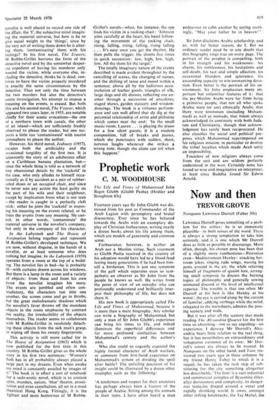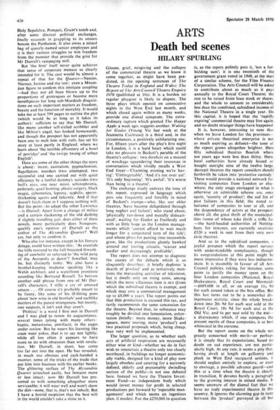Now and then
TREVOR GROVE
Nunquam Lawrence Durrell (Faber 30s)
Lawrence Durrell poses something of a prob- lem for the critics: he is so immensely plausible—in both senses of the word. There is always a strong temptation to take him seriously, and it is one which Mr Durrell does as little as possible to discourage. More often, though, his chosen pose has been that of a slightly more rumbustious—Petronian even—Mediterranean Huxley: cracking bar- room jokes, singing rude songs, waving his penis around in the air, the while relieving himself of fragments of quaint lore, arrang- ing small symposia to discuss the burning topics of philosophy and generally sowing animated discord at the level of intellectual repartee. The trouble is that too often Mr Durrell at his best is like Huxley at his worst: the eye is carried along by the current of familiar, eddying verbiage while the mind, relegated to the sternsheets, admires the pass- ing scenery and nods.
But it was after all the scenery that made reading The Alexandria Quartet for the first time so absorbing—not so say engulfing—an experience. I daresay Mr Durrell's Alex- andria bears little relation to the real thing, but it has nevertheless an extraordinary and voluptuous existence of its own: Mr Dur- rell's senses are always to be trusted. In Nunquam on the other hand, and Tune (re- viewed two years ago in these columns by my friend Henry Tube) to which it is a sequel, he has taken the rash step of sub- stituting for the city something altogether less describable. 'The firm' is a vast industrial and commercial complex of Byzantine (liter-
ally) deviousness and complexity, its danger- ous tentacles draped around a venal and rapidly shrinking world. It owns, amongst other trifling knicknacks, the Taj Mahal, the
Holy Sepulchre, Pompeii, Grant's tomb and, after some discreet political exchanges, finally succeeds in grappling to its unseen bosom the Parthenon. It also owns a mixed bag of queerly-named senior employees and it is their various struggles to win freedom from the monster that provide the grist for Mr Durrell's rampaging mill.
But 'the firm' itself never quite achieves that sense of corporate menace so clearly intended for it. The cast would be almost a repeat of that for the Quartet—Nessim, Narouz, Justine and the rest: even a Mnem- jian figure to confirm this intricate coupling —had they not all been blown up to the proportions of grotesques or become mere mouthpieces for long sub-Murdoch disquisi- tions on such important matters as freedom, beauty and the function of morality. It would take me at least 599 pages to outline the plot (which would be as long as it takes its author): sufficient to say that Mr Durrell, like many another self-exiled scribbler and like Milton's angel, has looked homewards, and though the prospect has not apparently been one to melt him with ruth, has set his story at least partly in England, where we learn about 'the terrible effrontery of a bowl of porridge' and 'the twirpy twang of urban English'. Here are some of the other things the story is about: incest, castration, pygmalionism, flagellation, murders (two attempted, two successful and one carried out with quiet efficiency by a lustful dummy), suicides (two bull's eyes, one near miss). schizophrenia. pederasty, quail hunting, plastic surgery, black magic, cybernetics, leprosy, syphilis, sperm- thickening agents and falconry. And if that doesn't fetch them in I suppose nothing will. But the point—to adapt the other Lawrence —is Durrell. Apart from a change of milieu and a certain slackening of the old dashing if slightly trundling gait, does either of these novels, more particularly does Nunquam, qualify one's opinion of Durrell as the author of The Alexandria Quartet? Well yes, but only to confirm it. Who else for instance, except in his literary dotage, could have written this: 'At eventide the hills resound to the full-breasted thwank- ing of cowbells' or referred to 'the wild pang of the Acropolis at dawn'? Jewelled, may be, but distinctly toshy. We also have a brothel-keeping madame speaking like a Welsh architect, and a waterfront prostitute sounding like Bertrand Russell. To borrow another odd phrase from one of Mr Dur- rell's characters, I stifle a cry of amused amaze . . Of course it's probably meant to be funny, like some of his ill-fitting puns about 'new wine in old brothels' and suchlike matters of the purest strangeness, but mostly, one suspects, it isn't and they aren't.
'Phthisic' is a word I first met in Durrell and I was glad to renew its acquaintance, several times (along with many others: haptic, metastasise, petrifact), in the pages under review. But he wears his learning like oxen wear yokes, that is to say not lightly; while all too often it appears to have more to do with obsession than with revela- tion. Mr Durrell, in short, has come too far out into the open. He has revealed, in much too obvious and cack-handed a manner, some of the tricks of the trade that put him into business with his earlier books. The glittering surface of The Alexandria Quartet scratched easily, but remains more or less intact: now Mr Durrell has pre- sented us with something altogether more serviceable; it will wear well and won't show the dirt—none, that is, that's not inbuilt. But I have a horrid suspicion that the best will in the world couldn't take a shine to it.



































 Previous page
Previous page